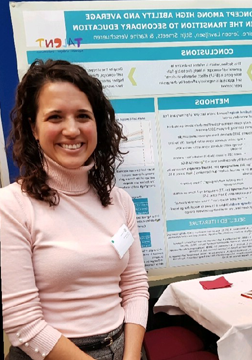Excellence in Research
The Mensa Foundation’s Awards for Excellence in Research recognize researchers who are building new knowledge in intelligence.
Presented annually, these awards honor exceptional work published in peer-reviewed journals or presented at professional conferences.
Details
A prestigious recognition in the field, the Awards for Excellence in Research celebrate innovative contributions that redefine how intelligence, giftedness, and related fields are studied and applied.
Award Components
- $500 Award: A monetary recognition of the recipient’s groundbreaking research.
- Publication in the Mensa Research Journal: Winning papers are featured in the Mensa Research Journal, showcasing the recipient’s contributions to a global audience.
- Formal Recognition: Honorees are celebrated for their work through the Mensa Foundation’s platforms and events.
Impact intelligence studies.
Share your research with us.
Apply NowApply Now Criteria
Key Eligibility Requirements
We welcome original research reports and theoretical papers that propose new research directions or review existing findings, providing fresh perspectives in the field of intelligence.
- Field Relevance: Papers must address topics related to intelligence, intellectual giftedness, creativity, or related fields.
- Peer Review: Entries must have been published in or accepted by a peer-reviewed journal or presented at a peer-reviewed professional conference within the past three years.
- Word Limit: Papers must not exceed 20,000 words (excluding abstracts, references, and appendices).
- Author Classification:
- Junior Investigators: Graduate students, post-doctoral researchers, or those with less than seven years of experience in their current field.
- Senior Investigators: Researchers who earned their doctoral degree more than seven years ago or have significant experience in their field.
- Language: Submissions must be in English or include an English translation.
- Supporting Materials: Provide a complete reference for the publication, along with any necessary supplemental materials to explain the research.
- Designate Investigator Category: Clearly indicate if the entry is for the Junior or Senior Investigator category.
- Eligibility Updates: If a paper is accepted for publication but not yet published, submit the manuscript or galley proofs by the deadline, followed by the complete reference upon publication.
- Unverified Work: Submissions that lack peer-review or sufficient documentation.
- Ordinary Literature Reviews: Reviews that do not offer new directions or focus for the field.
- Non-Research Articles: Chapters from books, textbooks, or articles written for general audiences.
- Repeated Submissions: Papers previously recognized with an award cannot be resubmitted, nor can winning authors submit as primary authors within three years of receiving an award.
- Excessive Materials: Limit submissions to one paper as the first author and up to three papers as a co-author. Additional materials will not be reviewed.
Frequently Asked Questions
Have more questions? Contact us at awards@mensafoundation.org.
The Awards for Excellence in Research celebrate groundbreaking studies in intelligence, giftedness, and related fields, recognizing contributions that advance knowledge and practice.
Researchers, educators, and professionals in relevant fields are eligible to apply. Authors do not need to be members of Mensa to qualify.
Eligible submissions include original research, theoretical papers, and reviews published in peer-reviewed journals or presented at peer-reviewed conferences within the past three years.
Yes, authors may submit their own published or accepted research for consideration, provided they meet the eligibility criteria.
Awardees receive a $500 cash prize, publication of their work in the Mensa Research Journal, and formal recognition from the Mensa Foundation.
Winners are chosen based on the quality, impact, and originality of their research by a panel of experts in intelligence and related fields.
The submission deadline is December 31. Applications received after this date will be considered for the following year’s competition.
Past winners may submit a new paper as co-authors but are not eligible to enter as primary authors within three years of receiving an award.
Yes, international submissions are welcome, but papers must be in English or include an English translation.
Avoid submitting book chapters, textbook content, articles for general audiences, or literature reviews without new contributions to the field.


















